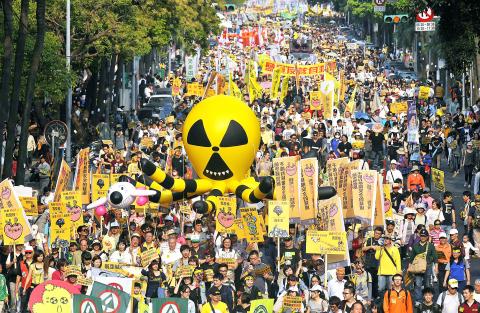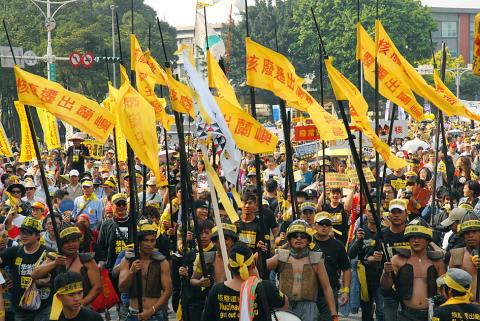“Halt construction of the Fourth Nuclear Power Plant, put an end to nuclear power,” massed crowds shouted as tens of thousands of people marched through the streets of Taipei City yesterday afternoon. Protests also took place in Greater Taichung, Greater Kaohsiung and Taitung City as people called for the government to phase out the use of nuclear power.
The Taipei demonstration was initiated by an alliance of over 150 civic groups that support the goal of achieving a nuclear-free homeland. The main demands of the demonstration included halting additional budget allocation for the yet-to-be-completed Fourth Nuclear Power Plant in New Taipei City’s (新北市) Gongliao District (貢寮), ceasing the installation of fuel rods at the plant, retiring the nation’s three operational nuclear power plants, removing nuclear waste from Orchid Island (蘭嶼) and reviewing nuclear waste treatment solutions. Demonstrators also called for zero growth in the nation’s electricity consumption.
Most of the participants at yesterday’s march took to the streets on their own initiative as the event’s organizers did not want mobilized crowds or the interference of political parties, said Humanistic Education Foundation executive director Joanna Feng (馮喬蘭), one of the groups in the alliance.

Photo: Reuters
In Tapei, the march, bustling with noise and excitement, was conducted in a festive and easygoing atmosphere with many young people dressed up in bright colors yellow anti-nuclear stickers plastered to their faces and clothing.
Performing artists danced to music while many parents brought their children, while a number of pet owners were seen walking dogs decked out with anti-nuclear banners.
Wearing a gas mask, a man surnamed Hsu (許) from Taoyuan County’s Jhongli (中壢) said he heard experts say it took a long time for residents to evacuate after Japan’s Fukushima Dai-ichi nuclear disaster.

Photo: Wu Liang-yi, Taipei Times
“I am concerned that Taiwan is too small to have enough safe places to evacuate to should a nuclear disaster occur,” he said. “Even a gas mask cannot save you if a nuclear disaster happens in Taiwan.”
At one stop on the route of the march, the organizers set up a paper money burner — traditionally used for burning paper money as offerings to deities or the deceased during religious rituals — so that people could burn fake banknotes in front of the National Treasury, mocking the Fourth Nuclear Power Plant as a “money burner.”
“This money burner represents the Fourth Nuclear Power Plant, because during two decades of construction, the budget for it continues to grow, but it remains unfinished with many defects and problems,” said Lee Cho-han (李卓翰), executive director of the alliance. “Let’s all put an end to this money burner.”
In front of the Council of Agriculture building, the Taiwan Rural Front explained to demonstrators how much damage a nuclear disaster could bring to the agricultural sector.
“I traveled to [Japan’s] Fukushima Prefecture last September and spoke with farmers, many of whom are now unemployed because their farms have been contaminated and can no longer be used to grow anything,” said Hsu Chao-wei (徐肇尉), a member of the rural group.
“Even for those whose farms are still viable, it’s still very difficult for them to sell what they grow because everyone is worried that their products may be contaminated and they always have to go through strict inspections and tests before making it onto the market,” Hsu added.
Hsu said that having suffered a nuclear disaster, the Fukushima farmers asked him to bring back a message to Taiwanese. “They wanted me to warn everyone in Taiwan about the dangers of nuclear power and wanted the public in Taiwan to work hard to push for abolishing nuclear power,” Hsu said.
Meanwhile, the Humanistic Education Foundation set up portraits of lawmakers who voted to approve additional budget for the Fourth Nuclear Power Plant and asked demonstrators to place recall ballots into boxes.
“We will deliver the ballots to the lawmakers’ offices to tell them that we are serious about launching a recall campaign if they do not take back their support for nuclear energy,” a host at one the booths said.
At a crossroad on Zhonghua Road (中華路) near Ximending (西門町), an area often crowded with young people on weekends, members of the Wild at Heart Legal Defense Association gave short lectures on information related to nuclear disasters as crowds passed.
“Here, where you are standing, we are only 28.2km, 25.6km and 41.9km away from the nation’s three operational power plants, so we are actually very close to them,” said Lu Shih-wei (陸詩薇), an attorney from the alliance.
At another stop on the march, a young woman stood on a stool holding pictures of child victims of the Chernobyl, Ukraine, nuclear disaster. Born in 1986, the year of the Chernobyl disaster, she said it was her destiny to be campaign against nuclear power.
Marchers could also sign postcards demanding: “people’s freedom from the fear of consuming radiation-contaminated food,” which were designed to be sent to the Department of Health (DOH).
The Homemakers United Foundation and the Raging Citizens Act Now also cordoned off an area with yellow warning tape and attached pictures of radiation-contaminated food to it. There were also placards detailing how human organs might be affected by nuclear radiation.
A special event was staged at 4pm when more than 300 volunteers stretched a 5km long yellow warning tape across an area surrounding the Presidential Office, symbolizing that everyone in the area would be forced to evacuate if a nuclear disaster occured.
While police estimates of crowd sizes were not immediately available, the event’s organizers said they estimated that 200,000 people took part in nationwide demonstrations — with about 100,000 participants in Taipei, 70,000 in Greater Kaohsiung and unspecified numbers in Greater Taichung and Taitung City — hailing them the biggest crowd numbers in the history of anti-nuclear demonstrations in the country.
An evening rally began at 6:30pm on Ketagalan Boulevard in front of the Presidential Office that included lectures and performances by Taiwanese bands and artists.
The rally went on into the night with broadcasts of anti-nuclear films, talks by film directors, short plays by performance artists as well as unplugged musical performances.
The Taipei demonstration was slated to end this morning with an anti-nuclear flag ceremony at 8am.

AIR SUPPORT: The Ministry of National Defense thanked the US for the delivery, adding that it was an indicator of the White House’s commitment to the Taiwan Relations Act Deputy Minister of National Defense Po Horng-huei (柏鴻輝) and Representative to the US Alexander Yui on Friday attended a delivery ceremony for the first of Taiwan’s long-awaited 66 F-16C/D Block 70 jets at a Lockheed Martin Corp factory in Greenville, South Carolina. “We are so proud to be the global home of the F-16 and to support Taiwan’s air defense capabilities,” US Representative William Timmons wrote on X, alongside a photograph of Taiwanese and US officials at the event. The F-16C/D Block 70 jets Taiwan ordered have the same capabilities as aircraft that had been upgraded to F-16Vs. The batch of Lockheed Martin

GRIDLOCK: The National Fire Agency’s Special Search and Rescue team is on standby to travel to the countries to help out with the rescue effort A powerful earthquake rocked Myanmar and neighboring Thailand yesterday, killing at least three people in Bangkok and burying dozens when a high-rise building under construction collapsed. Footage shared on social media from Myanmar’s second-largest city showed widespread destruction, raising fears that many were trapped under the rubble or killed. The magnitude 7.7 earthquake, with an epicenter near Mandalay in Myanmar, struck at midday and was followed by a strong magnitude 6.4 aftershock. The extent of death, injury and destruction — especially in Myanmar, which is embroiled in a civil war and where information is tightly controlled at the best of times —

China's military today said it began joint army, navy and rocket force exercises around Taiwan to "serve as a stern warning and powerful deterrent against Taiwanese independence," calling President William Lai (賴清德) a "parasite." The exercises come after Lai called Beijing a "foreign hostile force" last month. More than 10 Chinese military ships approached close to Taiwan's 24 nautical mile (44.4km) contiguous zone this morning and Taiwan sent its own warships to respond, two senior Taiwanese officials said. Taiwan has not yet detected any live fire by the Chinese military so far, one of the officials said. The drills took place after US Secretary

THUGGISH BEHAVIOR: Encouraging people to report independence supporters is another intimidation tactic that threatens cross-strait peace, the state department said China setting up an online system for reporting “Taiwanese independence” advocates is an “irresponsible and reprehensible” act, a US government spokesperson said on Friday. “China’s call for private individuals to report on alleged ‘persecution or suppression’ by supposed ‘Taiwan independence henchmen and accomplices’ is irresponsible and reprehensible,” an unnamed US Department of State spokesperson told the Central News Agency in an e-mail. The move is part of Beijing’s “intimidation campaign” against Taiwan and its supporters, and is “threatening free speech around the world, destabilizing the Indo-Pacific region, and deliberately eroding the cross-strait status quo,” the spokesperson said. The Chinese Communist Party’s “threats